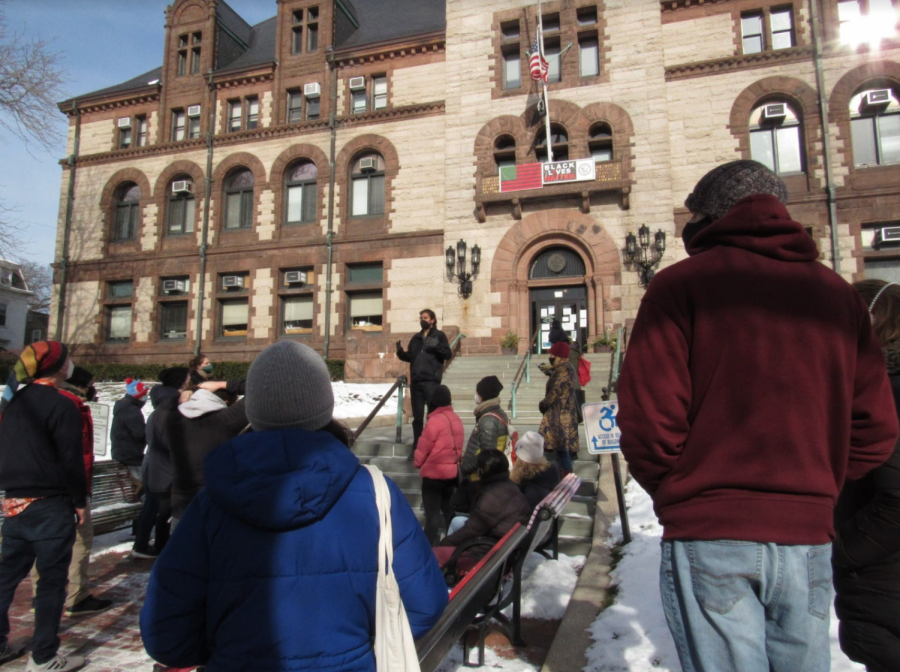An Interview With Project Right to Housing
Courtesy of Harvard Crimson: Councillor Jivan Sobrinho-Wheeler speaks at a Project Right to Housing event in Central Square.
March 28, 2021
Huma Gupta and Ben Roberts are the co-creators, along with Piper Winkler and Ann Fogler, of Project Right to Housing: a voluntary group of organizers pushing their proposal for non-congregate housing and protection of the unhoused population in Cambridge.
Register Forum (RF): What inspired or motivated you to begin developing this project?
Ben Roberts (BR): I grew up in San Francisco … I saw the city’s cruelty toward unhoused people; for example, the mayor canceled a program giving unhoused individuals access to hotel rooms, by wielding the power of local tech and bad press against them. In the spring of 2020, 121 unhoused Cambridge residents sent a petition to Cambridge City Council saying that the current housing situation is unsafe and inadequate. After that, we first proposed the idea that the city should provide free hotel rooms during the pandemic, and went from there.
Huma Gupta (HG): Before this project, I worked for the UN International Displacement Monitoring Center, spent time working for a local NGO (non-governmental organization) in Afghanistan fighting corruption in development agencies, and worked in Syria on urban planning. After all of these experiences, I decided to orient my work locally instead of internationally.
RF: What is Project Right To Housing’s greatest goal?
BR: Put simply, everyone deserves a home. Our movement wants to create a city, world, and Cambridge that works to make sure everyone has a place to live.
HG: We want to make Cambridge a true Housing First city. Everyone has the right to a home, no one should have to prove their sobriety, eligibility, or overall worth to have this right. A lot of Cambridge city leadership has misinterpreted what Housing First truly means and believes that we are proposing housing without also offering any sort of help, which is not true. The plan does not just give people a place to live but guarantees a whole set of services to support newly housed people.
RF: What is your organizing strategy?
HG: We use a two-pronged approach: public education and political pressure. The first part of this is seen in our December 2020 report to raise public awareness, hold orientations, and host public events. The second part of our strategy is to turn up the heat on the city council and hold them accountable for the things they claim to support, yet when it comes down to money and policy, we see these things are not actually being implemented. Essentially, we want to elect a city council that supports Housing First and addresses the power imbalance within local government.
BR: Our strategy evolves with the current situations. Because Cambridge City Council elections are coming up, our structure and work will change to address it.
RF: Does Cambridge have the capacity to make the proposal an immediate reality? If not, what is stopping them?
BR: At least for the immediate proposal, Cambridge has the capacity for non-congregate housing, because the Biden administration has promised 100% FEMA reimbursement, meaning it would cost the city literally nothing. The current obstacles are unwilling hotels—or so we are told—and lack of political will, which is mainly chiefed by the city manager who is opposed to the project.
HG: The city manager’s lack of interest in the proposal is our number one obstacle. This has always been a question of political will, not funding. The city claims that residents don’t want any more shelters or unhoused people, an apparent “nimbyism” [not in my backyard]. So basically, because some businesses in Central square and voices of a few citizens object, this public health crisis should be overlooked. There are two different standards of concern for housed and unhoused residents, especially during the pandemic: housed people are told to stay inside non-congregate spaces, while unhoused people are instructed to stay in congregate spaces, [which] heightens the risk of contracting and dying from COVID-19. Non-congregate housing should be mandatory, a lack of that shelter is tantamount to a death sentence.
RF: Your message emphasizes the urgency of prioritizing Housing First, what is at stake?
HG: We spend a lot of money on supporting the unhoused, but it is very inefficiently spent, meaning we are basically supporting people to stay chronically unhoused. Financially, for how much we are currently spending, everyone could be housed. Morally, everyone should be housed. Not all people want access to congregate housing because of the eligibility requirements, as well as the lack of privacy or freedom. Non-congregate housing makes people feel secure, providing a sense of security and an alternative to staying in abusive relationships or dangerous situations. There is a lack of moral sensibility in the belief that somehow people do not deserve housing, therefore providing this safeguard is unfair. What Cambridge residents need to understand is that the risk of becoming unhoused affects everyone.
BR: To re-emphasize that point, this could be almost any of us. With how housing is now, homelessness is not just something that happens, it is a threat to keep working no matter the conditions. We need to build this foundation for all of us … It is really difficult to organize if you have to worry about losing your home or you don’t have anywhere to live.
RF: Why should wealthy citizens of Cambridge be inclined to support the project?
HG: I can’t imagine why a single wealthy person would oppose Housing First, only if they believe in this idea that unhoused people are undeserving and unworthy. Many opponents follow this counterintuitive logic from the city manager: if we provide services to unhoused people, more unhoused people will come into Cambridge looking for resources. This is propaganda for people who deny them support. Nobody wants to be displaced, people want to be sheltered and housed in their own city.
BR: It is both cheaper for the city and improves public health; non-congregate housing lowers the spread of COVID-19, protecting the entire community. This is not only the right thing to do, but the best thing to do.
RF: How can people get involved?
BR: It’s really easy to get involved! Our website has all of the contact information you need. We need neighborhood captains, media leaders, and any other time you can commit. If you want to get involved more broadly, get involved in a mass organization, they are relatively easy to join and build community within. On your own, you aren’t getting anything done. As a part of a movement, you can create the power to build the city you want.
*Disclaimer: Cull-Kahn is involved with Project Right to Housing.










